Graduate Programs
The Master of Science and Master of Arts in Biology programs at Saint Joseph’s University are designed to provide training in technical and professional skills for students who wish to join the workforce as proficient scientists or for students who desire to pursue a doctoral or professional degree.
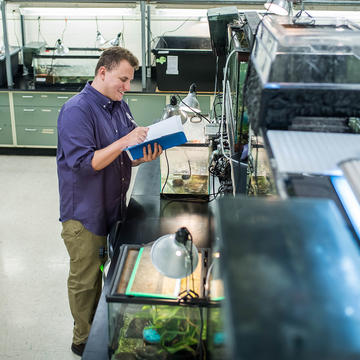
Graduate Biology Programs
The M.S. program is a thesis-based, full-time program designed to be completed in two years. The M.A. program is course-based and is designed for full- and part-time students. Current undergraduate students at Saint Joseph's with majors in biology or environmental science may be able to complete a combined 5-year B.A./M.A. or B.S./M.S. degree. Undergraduate students interested in the B.S./M.S. or B.S./M.A. (4+1) programs should contact their academic advisor before the end of their junior year.
Students in the M.S. and M.A. programs are required to take both lecture and seminar-style courses. Most lectures also have a lab component. M.S. students must complete a research thesis, while M.A. students are not required to complete one, but have the opportunity to conduct research for credits.
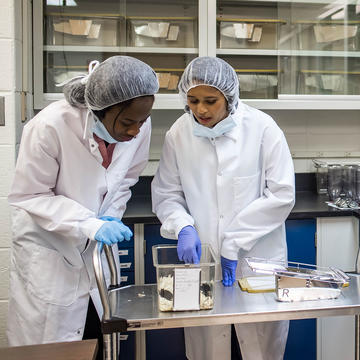
Fields of Study & Research
Faculty members in the Department of Biology teach a wide range of courses, including advanced cell biology, immunology, biochemistry, bacterial pathogenesis, microbiology, neurobiology, physiology, histopathology comparative anatomy, animal behavior and bioinformatics.
M.S. and M.A. students also have the opportunity to conduct research in the fields of cell biology, environmental and molecular microbiology, behavioral genetics, neuroscience and more. The department is well-equipped for teaching and research at the graduate level. Major equipment available includes transmission, scanning and confocal microscopes, tissue culture facilities, an extensive vivarium, and sophisticated plant growth chambers as well as a rooftop greenhouse and experimental green roof.
The following faculty have active research labs and may be open to accepting students for a thesis project (MS students), lab rotations (MS students), or research credits (MA students): Catalina Arango, John Braverman, Shantanu Bhatt, Jonathan Fingerut, Christina King-Smith, Julia Lee-Soety, Edwin Li, Scott McRobert, Bela Peethambaran, Jennifer Tudor, and Clint Springer. Information about their research can be found here.
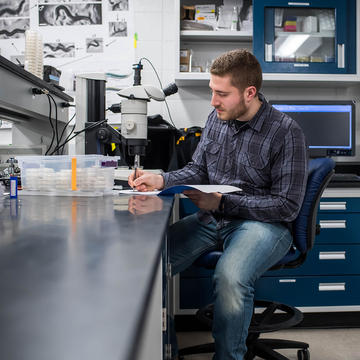
Financial Assistance
Full-time M.S. students are eligible for master's teaching assistantships (MTAs) that provide a partial tuition scholarship (up to 6 credits per semester), and a stipend for working as a teaching assistant in undergraduate lab courses. Students must apply first and be admitted to the M.S. program (preferably before April 1st) to be considered for the MTA.
Students applying for the M.S. program also have the option to conduct biomedical research with scientists at Lankenau Institute for Medical Research (LIMR) through the SJU-LIMR Fellowship. This fellowship offers a stipend and a small tuition scholarship for up to two years to students who carry out their thesis project at LIMR. The application can be found within the application portal for the M.S. program.
Other funding opportunities may be available to both M.A. and M.S. candidates. Students may get funded through their research mentors through external grants. Qualified students may also find employment as student workers helping out in undergraduate teaching laboratories.
Where Are They Now?
Our graduate biology students go on to pursue a wide range of career paths after completing their degree program. Here are a few of our graduates and their success stories.
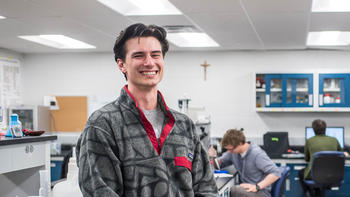
Christopher Saul '19 (M.S.)
Christopher Saul '19, from Dr. Matthew Nelson's lab, defended his M.S. thesis in the spring 2019 semester. He is currently pursuing a Ph.D. in Biological Science at the University of Delaware.
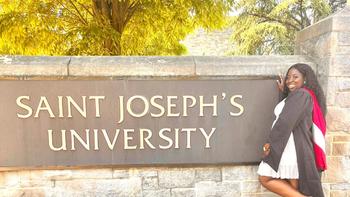
Courtney Wallace '21 (M.S.)
Courtney Wallace '21 (M.S.) did her thesis in Dr. Arango's lab. She is currently a Ph.D. candidate at Drexel University College of Medicine.
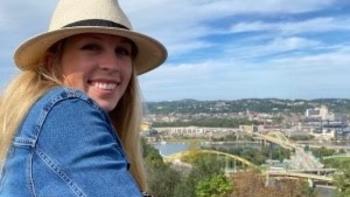
Jaime Reel '21 (M.S.)
Jaime Reel '21 (M.S.) completed her MS thesis in the lab of Dr. Jennifer Tudor. She is currently a Sr. Scientific Project Manager at Discovery Life Sciences.